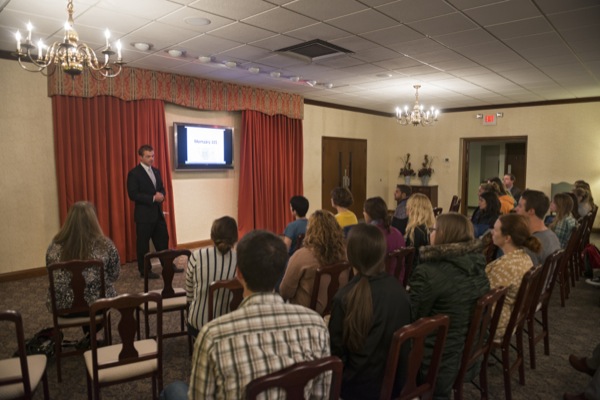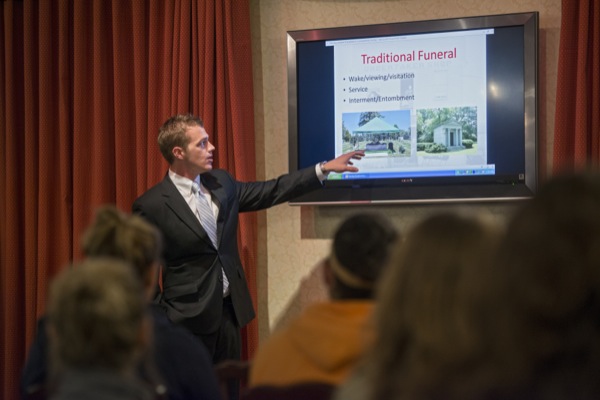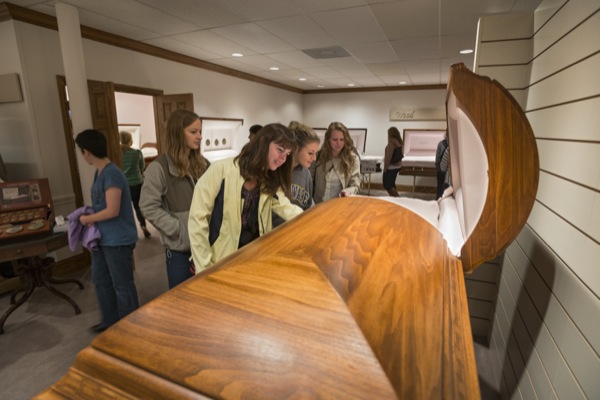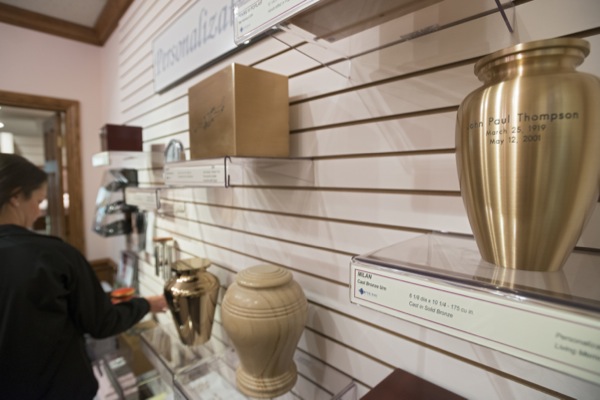


Understanding the undertaking
Nursing students learn about death and dying at funeral home
12:28 p.m., Oct. 8, 2012--In a PBS documentary called The Undertaking, poet and funeral director Tom Lynch says that we have become estranged about death and the dead. Later in the show, he says, “While the dead don’t care, the dead matter.”
Cynthia Diefenbeck wants to make sure that her nursing students at the University of Delaware don’t become estranged about death and the dead, and she wants them to know that the dead do indeed matter. So the requirements for her senior-level course, Care of Dying Patients and their Families, include watching The Undertaking and touring a local funeral home. Afterwards, they’re asked to comment on the experience in a forum on the course Sakai site.
Campus Stories
From graduates, faculty
Doctoral hooding
“One of the elements that’s underrepresented in health care provider curriculums across the country is care of dying patients and all that follows,” says Diefenbeck, assistant professor in the School of Nursing. “As a society, we have outsourced the care of the dying and the dead, effectively distancing ourselves from the process. Death is the new taboo. As health care professionals, we’re busy fighting disease and often feel defeated when it takes its inevitable toll. I think it’s good for students to confront their own fears and apprehensions about dying to become more effective professionals.”
The class tour is provided courtesy of Rick Harra, a 1980 graduate of UD and owner of McCrery and Harra Funeral Homes and Crematory in Wilmington, Del.
Harra, whose wife, Amy, holds a nursing degree from UD, agrees with Diefenbeck’s belief in the need for nursing students to become acquainted with death. “The more honest, straightforward information these students can absorb, the more effective they’ll be when they have to deal with the family of a patient who has died or is dying,” he says.
During the 90-minute tour, Harra’s nephew Todd, who is also in the family business, delivers a presentation he calls “Mortuary 101,” which provides basic information about topics ranging from burial and cremation options, types of services, and religious issues to preparation of the body and casket selection.
He then takes the group into the casket selection room, which is open to the public, and the embalming room and crematorium, which are not.
In the two closed rooms, the idea of death becomes more real, and the scene changes dramatically from the soft rugs, tastefully upholstered furniture, and muted lighting of the reception areas upstairs to the stark white walls, linoleum floors, and stainless steel tables of the basement.
One student admitted feeling a combination of surprise, discomfort, and fear during the tour, especially after seeing the embalming room and the crematorium, which she described in a forum post as “eerie.”
PBS narrator Lynch says that funerals are the way we close the gap between “the death that happens and the death that matters.” If he’s right, then these eerie rooms are where the behind-the-scenes work of that transition happens.
At the same time, the link between the nurse, who is often there when death happens, and the funeral director, who helps craft the death that matters, is an important one. Both play roles in the life and death story of an individual, and, as Harra points out, they need compassion and patience to do their jobs well.
“I was really unsure of how a funeral home related to nursing until last night at my hospice experience,” one student wrote on the forum. “I experienced the death of a patient, and the nurse’s immediate reaction was to call the family and then the funeral home. The nurse must be able to deal with grieving and know what to do when calling the funeral home.”
For another student, the tour and presentation helped clarify the psychological and emotional connection between medicine and the mortuary.
“A hospital setting is so stressful, with a direct focus on curing the sickness, whereas a funeral home is there to say that it is OK that [the person] is gone, and we should try our best to do what the deceased would want,” she wrote. “It gives the family a sense of control that they didn’t have when they were in the hospital with all the tubes and wires that nurses and doctors control.”
For one student, the tour simply reinforced what she already knew.
“How thankful I am to have grown up in the funeral business,” she wrote. “It has given me a unique perspective on life that I would not have had otherwise. It has made me a more thoughtful, empathetic person who realizes the fragility of life, and while it has perhaps made me a little cautious, it has made me want to live life to its very fullest.”
Diefenbeck notes that the students came away from the experience “more aware of the realities of the dying process, more compassionate toward families who are muddling through those difficult days following their loved one’s death, and more comfortable with the dying process and therefore with their roles as nurses.
“In addition,” she says, “having seen the-behind-the-scenes workings of the funeral home, they will be able to provide guidance to families as they navigate this monumental life transition.”
The prospective nurses also have a greater appreciation for the contribution made by the funeral home in, as one student put it, “providing an experience that is the first step in helping people heal.”
“End of life should be centered on the holistic care of the dying individual and the people who love him or her — not on a set of medical problems to be addressed,” says Diefenbeck. “The funeral home plays an important role in honoring a dying person’s wishes and telling his or her story, and I am extremely grateful to the folks at McCrery and Harra who help to humanize the entire process for our students.”
About the course
The course, NURS 411, Biopsychosocial Care of the Dying Patients and their Families, provides a comprehensive overview of the dying process, including biological, psychological, social, and spiritual aspects.
Biopsychosocial nursing care of terminally ill patients and families is covered, including pain management, non-pain symptom management, nutrition and hydration, comfort, communication, psychosocial support, and spirituality.
Ethical issues and cultural aspects of care are integrated throughout the course.
Students are required to participate in simulation labs and clinical field experiences.
Article by Diane Kukich
Photos by Evan Krape











